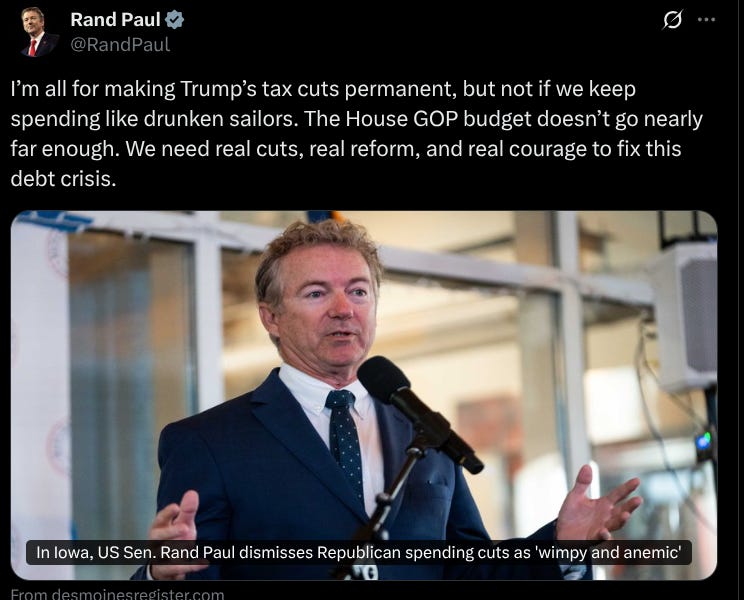Trump's Big Beautiful Bill: A Betrayal of Fiscal Conservatism
Despite promises, H.R. 1 adds $3.1–$5.1 trillion to the deficit and expands government intervention
Okay, not to beat a dead horse, but yep, as it moves through the U.S. Senate, I’m writing about the Big Beautiful Bill (H.R. 1) once again. Here is my recent piece as it emerged from the U.S. House of Representatives.
In addition to the immigration issue, Trump was voted in to cut spending and get our fiscal house in order. I believe this is undisputed. So, why is he and his followers so eager to increase spending, increasing our federal debt beyond the current $36.2 trillion? After all, we are genuinely well into a fiscal crisis with over $1 trillion each year just going to pay the interest on that debt. Only a few elected officials have been sounding the alarm, while others go along like sheep. It’s so sad to watch in real time.
Right now, the sausage is being made in the U.S. Senate. We do not know what the final bill will look like, but we do know some main tenets that will likely remain—and it ain’t good. While no specific date for a public Senate hearing has been confirmed, the Senate is expected to take up the bill next week, with both chambers returning to Washington on June 2, 2025. Senators are likely to work on changes to the U.S. House version behind the scenes before bringing it to the floor, with discussions and potential debates expected in June. The process could extend over weeks due to anticipated modifications, with a goal of final passage by July 4, 2025, to meet the debt ceiling deadline. You know, so that we can increase the debt ceiling once again.
Americans voted for fiscal responsibility and reducing national debt, viewing deficit spending as a burden on future generations and a driver of inflation. The bill is projected to add $3.1 trillion to the federal deficit over ten years, according to Congressional Budget Office estimates, or up to $5.1 trillion if temporary provisions (like bonus depreciation) are extended. The bill’s failure to offset tax cuts with equivalent spending reductions violates the principle of living within fiscal means.
Trump has derided ObamaCare for years, stating he would replace it with “much better healthcare," and more recently, he has indicated he doesn't want to "terminate" Obamacare, but wants to make it "better" and "less expensive.” The Big Beautiful Bill extends ObamaCare (ACA) premium subsidies through 2030, maintaining many Medicaid provisions, and continues Biden’s energy and manufacturing tax credits. What happened to reducing the size and scope of the federal government in our lives?
H.R. 1 is the opposite of what Americans voted for; primarily due to its $3.1–$5.1 trillion deficit increase, extension of government programs like ACA subsidies and Medicaid, and failure to enact significant spending cuts or entitlement reforms. Its targeted tax credits, debt ceiling hike without structural fixes, and opaque omnibus structure further clash with libertarian principles of fiscal restraint, individual liberty, and minimal government intervention. U.S. Senators Rand Paul and Ron Johnson are actively opposing and/or demanding changes to the bill in the Senate, reflecting these concerns. As the Senate debates the bill in June 2025, amendments addressing deficit reduction or eliminating subsidies could help mitigate some criticisms; however, the current framework is largely at odds with what was promised.






